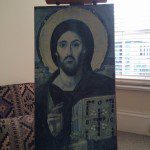 Yesterday was a very rich day of healing for me. So many of my readers reached out to me after my last post about feeling myself sliding back into depression again. My district superintendent from Virginia called me yesterday morning less than twelve hours after I’d posted. Another pastor friend texted me a beautiful prayer. I could feel palpably the support of so many prayers. But the richest part of yesterday happened when I spent an hour and a half in a room with an icon of Jesus at the Advent House spiritual retreat center. I’m going to try to explain what happened though my words will not do justice to it.
Yesterday was a very rich day of healing for me. So many of my readers reached out to me after my last post about feeling myself sliding back into depression again. My district superintendent from Virginia called me yesterday morning less than twelve hours after I’d posted. Another pastor friend texted me a beautiful prayer. I could feel palpably the support of so many prayers. But the richest part of yesterday happened when I spent an hour and a half in a room with an icon of Jesus at the Advent House spiritual retreat center. I’m going to try to explain what happened though my words will not do justice to it.
First, I have never received any instruction on how to pray to icons. So if there is a proper way of doing it, I didn’t. Please be gracious to me, those of you who are Orthodox or Catholic, if I’m not saying the right things about this Jesus icon. I know that God used that time powerfully even for one who is completely ignorant. All I did was to stare at Jesus’ face and his hands and listen for him to say something.
This particular icon replicates a 6th century Christ Pantocrator. What’s interesting about the image is that Jesus actually has two different faces on the left and the right, meant to symbolize his dual divine and human nature. But the effect ends up making his face look a bit misshaped and awkward. The title pantocrator is supposed to mean “almighty.” It’s a word that mostly gets used in Revelation when God’s kicking ass. But there’s nothing about this painting that makes Jesus look “almighty.” The gesture of his hand and the shape of his fingers seem delicate and tentative. So I have no idea whether that irony is supposed to be part of the painting or if I’m just superimposing my subjective presumptions onto a culturally stylized work of art that has a set of rules for how it’s allowed to be interpreted (which I’m afraid is probably the case).
In any case, I didn’t read any of this information about the icon before I encountered it, and, as shamelessly Protestant as this might be to say, I’m more inclined to reflect on the icon according to my own subjective personal experience of it rather than trying to force myself to “see” whatever meaning is actually intended by its stylized features. What I saw in my Jesus with a misshaped face and delicate hand was someone who wanted to bless me but felt timid about doing so. In other words, I saw in his features precisely the lack of confidence that I have been feeling as a minister. I desperately want to bless the students of Tulane and Loyola, but I haven’t figured out how to win their trust.
The icon was saying to me, Will you let me bless you? And I said, Of course, you can bless me; I so need your blessing right now. But it was like Jesus didn’t trust my answer, that I would really let him bless me. So I kept on saying in my head, Yes, Lord, you know that I want your blessing. Kind of like Peter’s exchange with Jesus on the beach after the resurrection. Do you really love me, Peter? Lord, you know that I love you. And somehow that strange mystical “dialogue” lifted a huge weight from my heart. I didn’t need an omnipotent Jesus at that moment in time. I needed a Jesus who was willing to be weak and timid out of solidarity with me.
I’ve written some experimental thoughts before that got a lot of backlash, speculating that God doesn’t just show his sovereignty as an all-powerful king (Father), but also as a crucified victim (Son) and a rebellious whirlwind (Holy Spirit). God does say to Paul in 2 Corinthians 12:9, “My power is made perfect in weakness.” I often insert a “your” before “weakness” to make it into God telling Paul that Paul’s weakness brings him glory by providing a contrast with his divine power which is certainly a theme elsewhere in the Corinthian letters. But there’s no “your” in the original Greek text, which means that it’s saying that weakness in general displays God’s power in a perfect way, a way more scandalous statement.
In any case, as much as it might make some people gnash their teeth for me to say this, yesterday in that room, Jesus overpowered me and wounded my heart not by being the strong, confident shepherd who has everything under control, but by presenting himself as my weak and timid friend. He showed me solidarity, and through his embrace of my weakness, he gave me strength. Hebrews 4:15 says, “We do not have a high priest who is unable to empathize with our weaknesses.” So even if I didn’t pray to the icon according to whatever rules there are about praying to icons, I had a beautiful encounter with my friend Jesus who made himself weak to sit with me in my weakness. And I’m thankful for that.
















